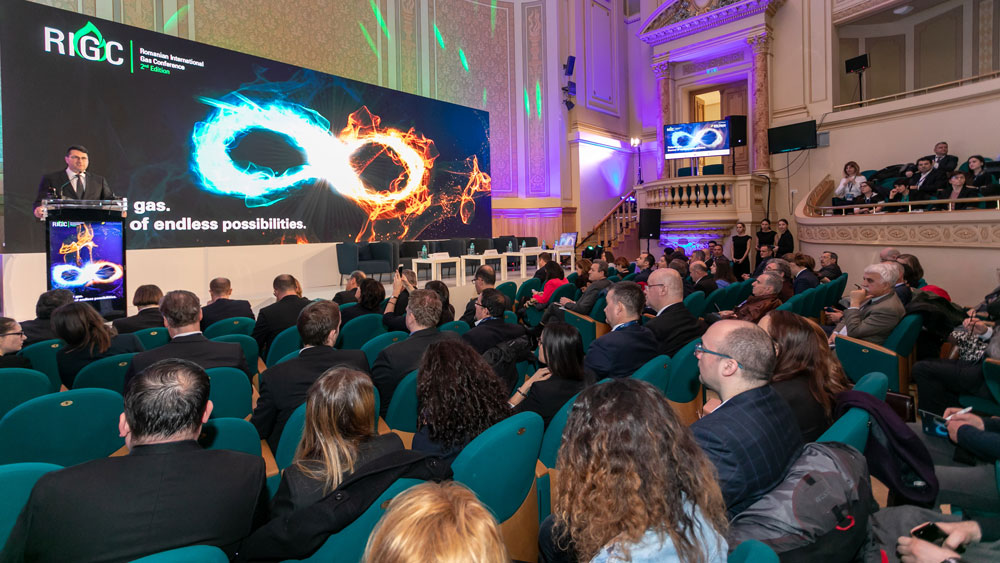Top challenges in the gas sector on the agenda of Romanian International Gas Conference
Considering that Romania holds a considerable growth potential relative to the regional gas market, a stable and predictable regulatory framework is a prerequisite for encouraging investments. In the context of the disputed GEO 114, the representatives of companies say that Romania risks missing on the opportunity of becoming a gas hub at the level of South-Eastern Europe. Moreover, predictability is the one that can substantially contribute to our country’s energy independence. Franck Neel, Executive Board member responsible for Downstream Gas at OMV Petrom and FPPG President, believes that gas plays a key role in solving the current challenges – increased energy demand and climate change. Therefore, it is worth continuing the flow of new discoveries, as this represents an opportunity not only for companies, but also for the economy as a whole. For opportunities to materialize, it is important to have an adequate regulatory framework, fiscal stability, conditions of competition, key infrastructures and liberalized markets.
The second edition of RIGC – Romanian International Gas Conference – brought together on 13 March, in Bucharest, officials and experts both Romanian and from the Member States of the European Union, in order to debate the main challenges and development opportunities specific to the gas sector in Romania and in the region.
The role of natural gas in energy and climate strategies was addressed by European Commission representatives through the voice of Catharina Sikow-Magny (DG Energy), Gerd Bommer (Austrian Embassy Commercial Counsellor), Zakonyi Botond (Hungary’s Ambassador to Romania), Julian Popov (Goodwill Ambassador for Energy and Climate, Bulgaria), as well as Aliki Skliri (Director of the Hydrocarbon Directorate in Greece).
The topic focused on the capitalization of natural gas at present and in the near future was communicated from the point of view of representatives of some of the most important companies in the sector, OMV Petrom, Engie and E.ON.
Viorel Toma, President of ANPM (National Agency for Environmental Protection), congratulated at the beginning of RIGC – Romanian International Gas Conference the initiative of organizing debates at international level. He claims that the development of the gas sector on the energy market is in a mutual support dynamic, also pointing out the involvement of the Ministry of Environment especially in carrying out programs for the reduction of greenhouse gases. The delegate official of the Ministry of Environment recalls that at present methane concentration is twice as high as in the pre-industrial era. In this regard, modern gas-fired power plants are part of the adequate long-term solutions, taking into account the considerably lower construction time – the average being two years compared to five years for coal and eight years in the case of nuclear units.
The representative of the Ministry of Energy, State Secretary Iulian-Robert Tudorache, brought to the attention of the participants that transition to a decarbonized economy is not easy to achieve. However, decarbonization strategies based on gas are less costly than those based on electrification. “Romania has a balanced energy mix, which can give its energy industry a sustainable future. Hydrogen is an essential element towards low-carbon energy. Depending on carbon capture and storage (CCS) technology, hydrogen has the potential to become the green alternative to fossil fuels.” The State Secretary highlighted that solutions dedicated to decarbonization are focused around three pillars: energy security, energy poverty and the environmental problems specific to each state.
The conclusions of the conference presented by Razvan Nicolescu, Senior Partner at Deloitte, highlighted the two major challenges of the natural gas sector, the first being related to the growing demand and the other caused by climate change.
“Adopting the same behaviour as before, we will not reach the climate change targets assumed for 2030. Substantial changes are necessary. Further, we need to believe in markets and if there isn’t sufficient competition then we will have to create it. Otherwise, it will be very difficult to capitalize on this country’s potential,” Razvan Nicolescu said.
The conference organized by EPG (Energy Policy Group) in partnership with IOGP (International Association of Oil & Gas Producers), FPPG (Oil and Gas Employers’ Federation) and ACUE (Federation of the Associations of Energy Utility Companies, Romania), through the presence of over 150 experts recognized in the industry aimed to provide an integrated approach of impact issues currently faced by the energy industry: the offshore law, GEO 114, sector decarbonization, the energy strategy of the country and the project of the national integrated plan – energy and climate change 2021-2030.



